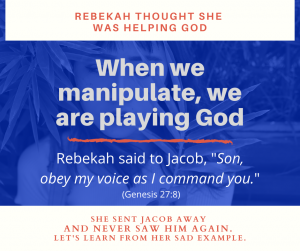Did your family ever say, “Don’t tell Mom. She’ll worry!”
Unfortunately, ours did. We thought it was a wise thing to do, but in reality, it was a subtle form of manipulation.
Whenever I think of that sinful strategy, I think of the biblical Rebekah who kept secrets. She wasn’t necessarily preventing someone from worrying, but she was trying to make happen what she thought was best. That’s what we’re doing when we say things like, “Don’t tell them! They will worry!”
In effect, our attitude, like Rebekah’s, is “do what I say; no need to seek God yourself.”
That’s the same with withholding information from someone. But maybe God wants a person to know the information so that they can see their need of casting their cares on Jesus (I Peter 5:7). Or so that they can face their fears and examine where the fear came from.
When we manipulate or try to protect someone, we are playing God. TWEET THAT!!!
So let’s learn from the story of Rebekah, who, from a human standpoint, had a lot to worry about.
Before her twin sons were born, God told Rebekah, “Two nations are in your womb; And two peoples shall be separated from your body; And one people shall be stronger than the other; And the older shall serve the younger” (Genesis 25:23 NASB).
When they were grown, Rebekah hatched a plan to make sure God’s prophecy would happen–that the younger, Jacob, would get the inheritance rather than the older one, Esau. When it appeared it wouldn’t, Rebekah couldn’t trust God and forced it to happen her way. Because Esau was swindled out of his inheritance, he threatened his brother’s life. Then Rebekah took matters into her own hands again! She encouraged her husband, Isaac, to send Jacob away to her brother’s home to visit, thinking he could return soon (Genesis 27:41-45).
We can only imagine the worry that consumed her as she fretted over her favorite son, Jacob. Maybe it played out like this:
Rebekah paced across the rugs on the dirt floor of the tent. “Oh, my, oh my! What can I do? Esau is going to kill Jacob. I just know it!” She stopped wringing her hands long enough to peek out through the flap in the tent, fully expecting to see Jacob stumbling up to her, blood pouring from a knife in his chest saying, “Esau stabbed me! Help me mother!”
“Oh no! Oh, no! Oh Jehovah, you got us into this mess when you said Esau would serve Jacob. Why did you do that? Can’t you see the problems that has made? Well, I’ll just have to take care of this. What can I do?”
Rebekah continued to pace and wring her hands until she slashed a cut in her hand with one of her fingernails. She drew the blood, trying to make the wound close up, when the thought suddenly popped into her brain. “That’s it! I’ll send Jacob to my brother’s house! That’ll keep him out of harm’s way, and then he can come home as soon as Esau’s anger cools. Oh, I’m so glad I thought of it! This will solve all our problems!”
We sadly shake our heads in dismay, because Rebekah’s manipulations didn’t solve anything. God knew all this would happen when He determined the future and his prediction did indeed occur.
The saddest thing, though, is that Rebekah never saw her beloved son again. He stayed at her brother’s house for many years, and she died before he returned. We can only imagine the loneliness and sadness she experienced in those years of waiting for him.
Her worry and manipulation had stolen from her the very thing Rebekah tried to protect: her son’s presence.
Rebekah’s form of manipulation was only one way we handle worry. There are many, including “Don’t tell mom. She’ll worry.”
How have you resisted worry turning into manipulation? TWEET THAT!!!!
(This post is adapted from my book, Partly Cloudy With Scattered Worries). 

Such a true example of what happens when we deceive ourselves through worry and strife. Well said author!
Thanks, as always, J.D. for being a part of this ministry. I appreciate you, sir!